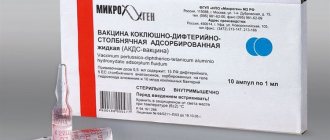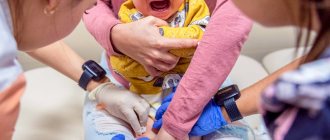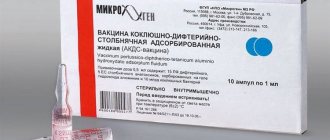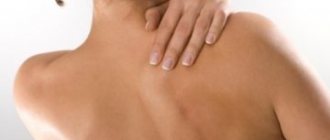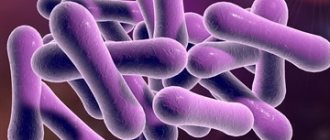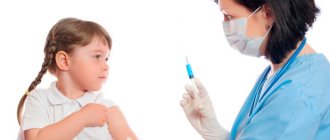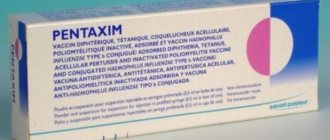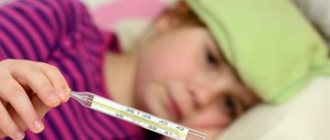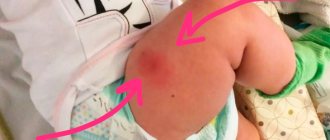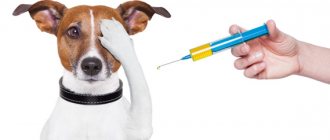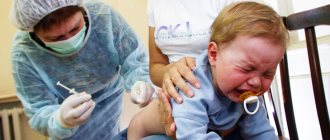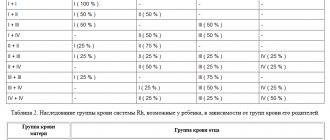Author of the article
Daria Shirochina
Practitioner. She graduated with honors from Vitebsk State Medical University in 2012 with a degree in general medicine. She was awarded a certificate of honor for her achievements in her work.
Ask a Question
Any vaccination carries the risk of developing pathological reactions or allergies on the part of the human body. However, the risk of contracting the disease and its complications is much higher. Therefore, all doctors advise vaccinating children. Some of the drugs are difficult to tolerate. The most striking example is the combined vaccine against whooping cough, diphtheria and tetanus. Many parents complain that their child has a cough after DTP. The vaccine is not always to blame. Undesirable reactions are caused by many associated factors.
What is DTP
Prevention of diphtheria, whooping cough and tetanus is mandatory for the entire population. According to WHO recommendations, children should be vaccinated for the first time at the age of 2 months. After 30 or more days, the drug is re-administered twice. The next stages are in 12–18 months and 3–4 years. After 5 injections, the baby is considered vaccinated, that is, he has stable immunity to the components of the product. It lasts for 10–12 years.
DTP stands for adsorbed pertussis-diphtheria-tetanus vaccine. The drug contains dead cells of the whooping cough pathogen, as well as toxoids of two other infections (the poisons they produce). After these substances enter the body, an immune reaction occurs against them.
Specific protective cells (antibodies) are produced, which in medicine is called acquired resistance. In case of infection, special proteins are activated and neutralize the pathogen. The disease will not develop at all or will be mild (with less likelihood of complications).
Due to the fact that the vaccine is whole cell (contains pathogen cells), it is recognized as reactogenic - it causes local and general reactions of the body. However, this drug provides stable, strong immunity, and is therefore recommended for use in countries with low vaccination rates.
In Europe, where vaccination rules are observed with particular strictness (over 90% of the population is vaccinated), you can use DTaP, a variant of the vaccine with an acellular pertussis component (fragmented cells). Such drugs cause reactions and complications to a much lesser extent.
Both types of vaccines are high-quality and certified, but have different mechanisms of influence on immunity. In post-Soviet countries, whole-cell drugs are widely used due to the low level of vaccination of the population and the high risk of epidemic outbreaks.
Normal reaction to DTP
If the vaccination rules are followed and the baby has an adequate immune response, mild nonspecific reactions occur after the DPT vaccination.
Among them:
- irritability;
- poor appetite;
- pain and redness at the injection site;
- increase in body temperature to 38 0C.
Normally, these phenomena occur within 72 hours after vaccination and disappear within 2–3 days. They do not lead to health problems. In the case of DTP, children often limp on one leg. This is caused by inflammation in the thigh muscle (where the medicine is injected). The discomfort will disappear after a few days, which is normal.
Any vaccine can cause moderate to severe reactions. The consequences of DPT include the following:
- heat;
- ataxia (uncoordinated muscle movement without weakness);
- severe swelling at the injection site;
- anaphylactic shock;
- convulsions (against the background of elevated temperature).
These conditions require emergency medical attention. A post-vaccination complication may be encephalopathy - inflammation of the meninges with the risk of serious damage to the nervous system.
Coughing is not a normal reaction to the vaccine. Atypical (uncharacteristic) consequences occur in children with individual characteristics of the body, as well as when vaccination rules are violated.
The baby developed a cough after the DPT vaccination: causes and treatment approaches
In order for a child to grow and develop normally, it is necessary to protect him from dangerous diseases that can lead to terrible complications. For this purpose, humanity has long invented vaccines.
ACDS is one of them, which provides protection against the 3 most dangerous diseases: Tetanus, diphtheria, whooping cough. Children usually tolerate vaccination well, but the immunity created after vaccination sometimes causes side effects, such as coughing after DTP.
Can a child have a cough after DPT vaccination?
The ACDV vaccine is considered one of the most reactive. The whooping cough component is mainly responsible for all the side effects. This vaccine is administered to children 4 times. The first three times are prescribed to infants from 3 months of age with a break of approximately 1.5 months.
The last fourth vaccination with this vaccine is administered at 1.5 years of age. This regimen allows you to maintain strong immunity against these diseases. Further post-vaccination is carried out by ADS or ADS-M, which no longer contain pertussis components and do not cause such rapid reactions in the body.
Sometimes parents choose an imported analogue of this vaccine - Pentaxim, which protects against 5 diseases at the same time. The stamina component is cellular in form, so it doesn't cause as much of a 'side' as ACDS.
Is it possible to vaccinate if you have a cough?
Only one condition is recognized as a contraindication for DPT - an anaphylactic reaction to the initial administration of the vaccine. In this case, repeated injections are not given. Immunodeficiency conditions and a history of encephalopathy are not considered limitations. The decision to vaccinate children with such diagnoses is made on an individual basis.
The main rule of vaccination is that the first and repeated doses of the drug are administered only to patients without signs of health problems. If an acute respiratory viral infection, cold, cough, runny nose, or exacerbation of a chronic disease is detected, you need to wait for complete recovery. The vaccine is given 2 weeks after all symptoms disappear.
The DPT vaccine contains whole cells of the pertussis pathogen. Some children are hypersensitive to them. It cannot be detected through tests or examination. Hence the rare unpredictable reactions or complications.
It is necessary to observe the interval between the DPT vaccination and the last symptoms of the disease. This reduces the risk of administering the vaccine against the background of complications or residual pathological effects. However, the risk of an injection during the incubation or prodromal periods (asymptomatic carriage) of the infection remains for all children, and medicine is unable to do anything about it.
Can it occur after vaccination?
If a child develops a cough after DPT, you should consult a doctor. This reaction is not typical for the vaccine and is not always caused by it.
Several factors influence the side effects of vaccination:
- the baby's health status;
- immune activity before drug administration;
- compliance with vaccination techniques;
- DTP quality;
- individual characteristics of the body.
It is impossible to track them all and accurately predict the result. Parents need to monitor the health of their child from birth, properly prepare him for vaccination, monitor the actions of medical personnel, and carefully monitor the baby’s condition after the injection.
A cough may occur due to DTP if:
- the child has recently had contact with sick adults or peers;
- became hypothermic shortly before visiting a medical facility;
- contracted an infection while in hospital;
- was in crowded places after the injection.
When vaccinated, the baby’s body is faced with an infection unknown to it. The immune system is activated precisely against it. Due to natural imperfections in defense mechanisms, infection with other harmful viruses or bacteria is extremely undesirable. At this time, the immune system is “busy” with toxins from DTP and cannot adequately repel the attacks of other infections. Hence the high risk of cough and other symptoms of ARVI.
You cannot get whooping cough from the vaccine. However, you need to understand how the toxins of this pathogen work. They are neurotropic - they tend to affect nerve tissue. Cough with whooping cough is caused precisely by excessive irritation of the corresponding center in the brain. That's why he is dry, barking, irrepressible. The reflex persists long after complete recovery.
The dose of DTP toxins is designed for children in the first year of life. Their immunity reacts sluggishly to foreign antigens. With age, protective forces become more active. To mobilize the immune system, a much smaller dose of pathogen toxins is needed.
If DTP is not done on time (later than 12 months), the risk of developing adverse reactions increases, since the amount of toxins exceeds the need. Unprocessed antigens can irritate nerve endings and cause coughing.
Reasons for visiting a specialist
You should immediately consult a doctor if the reflex is accompanied by:
- profuse lacrimation;
- high temperature;
- increased attacks at night;
- vomiting against the background of coughing;
- redness and swelling of the mucous membranes of the larynx.
This reaction is extremely rare, since all DTP vaccines are standardized and undergo safety control. However, it cannot be ruled out.
Eliminating cough after vaccination
If you notice any problems in your child’s well-being due to vaccination, you should consult a doctor. The specialist will conduct an examination and prescribe tests. Based on them, the exact cause of the cough will be determined and the appropriate treatment will be selected. Stimulation of immunity after vaccination is undesirable. Therefore, the doctor is unlikely to recommend immunomodulators or antivirals.
Often, symptomatic treatment of cough with drugs is selected:
- Stoptussin,
- Herbion (primrose or plantain),
- Erespal,
- Ascoril,
- Alteyka.
The remedy is prescribed taking into account the type of cough. Therapy lasts 3–5 days. During this time, the symptom should disappear. If it persists, the doctor will prescribe another drug or antibiotics. Mustard plasters, heat compresses, infusions and decoctions can only be used after consultation with a specialist.
If a dry cough occurs in an infant, you should immediately contact your pediatrician. Hospitalization may be required.
How to treat cough after DTP vaccination
What do you expect from vaccination? Its main task is to create stable immunity against the infections against which it is vaccinated. Vaccination works and provides protection. Their effectiveness has been proven by several generations of patients.
ACDV is a complex adsorbed vaccine that helps produce antibodies specific for three infections: whooping cough, diphtheria, and tetanus. Humans do not have innate immunity. The risk of death in unvaccinated children is 1:1000 and in vaccinated children 1:100,000.
The injection is made into the thigh muscle. In 95% of cases there is effective resistance. The ability to form antibodies depends on age.
In adults, it remains stable until the age of ten, so periodic booster vaccination is necessary. Children are given DAXDS in the first 2 months of life, then at 3, 4 and 18 months.
Repeated vaccinations at ages 6, 11, 16 years. After adulthood, re-vaccination is carried out every 10 years.
The procedure is subject to much controversy about safety. But we must understand that no medicine has been studied as thoroughly as a vaccine. Private medicines undergo strict quality control; they must meet standards approved not only at the level of ministries of the Russian Federation, but also by the World Health Organization.
In case of contraindications, you should consult your doctor in advance. The patient must be healthy at the time of vaccination. If there is even the slightest discomfort, ACD should not be performed.
There are several reasons why vaccination should be delayed:
- PRS;
- viral and infectious diseases;
- poisoning of the body;
- disorders of the central nervous system.
It is important to monitor the patient's health both before and after the procedure. Signs of respiratory diseases (runny nose and cough) often appear in a child after ASD. The symptoms are frightening and warning. It is important to prepare in advance with knowledge and be positive in this regard.
Since the anxious mood is transmitted to the child, he also begins to worry. It is recommended to study the available information about the whooping cough and tetanus vaccination, and if there are no answers, you should contact your pediatrician.
Which condition is considered normal and which is pathological? Is coughing after ACDS a cause for concern?
Can a child have a cough after DTP vaccination?
Different patients tolerate medications differently, and the body's response to vaccination is unpredictable. It does not wait and occurs in the first hours, less often during the day. In most cases, it does not pose a danger to life and health. Some vaccinated people report coughing. This is an atypical picture and requires careful consideration.
Causes of cough
Cough is an allergy and infection. The allergy is accompanied by bronchospasm and wheezing when breathing. Allergies often manifest as skin rashes, so infection is more likely.
Complications occur in one third of vaccinated people. The cough that occurred after the child was vaccinated with ACDV is due to the fact that the doctor's recommendations were not followed. Signs of ARVI are indirectly related to the procedure and should alert parents. The disease occurs against a background of weakened immune system function. The infection occurs in places with high levels of congestion, often in healthcare settings. Requirements for infection:
- less than 30 days after recovery;
- injection in the absence of visible symptoms of the disease (incubation period);
- contact with sick people.
How to prevent side effects
A child's health and proper functioning of the immune system are positively influenced by walks in the fresh air, sufficient sunlight and a balanced diet. Inferiority of one of these factors leads to a decrease in the body's resistance to infections.
To prevent coughing and other complications of DPT, you should limit your child's contact 3-5 days before vaccination. Walks on the street and active games are not canceled, but taking the baby to visit or supermarkets is undesirable.
If possible, it is necessary to reduce the time spent in a medical facility on the day of the DTP injection (according to statistics, it is in a hospital setting that those vaccinated become infected with ARVI). It is better to take a walk near a medical facility for 30–40 minutes after the injection (in case of an acute allergic reaction).
There is no need to force the child to eat 1 hour before and 3 hours after the injection. In the next 3 days, feed the baby according to appetite (if there is none) or slightly underfeed (if appetite is good). Overeating during the period of active immune function is extremely undesirable. Visits or trips should also be postponed by 3-4 days.
Temperature does not affect the quality and stability of the immunity developed after vaccination. If a child has a temperature of 37.5 0C, you can safely give an antipyretic. High levels can lead to seizures.
How and with what to treat cough after DTP vaccination
Currently, many people are wondering about the need to vaccinate children. The vaccines used are said to have many side effects.
At the same time, it should be understood that they can also seriously reduce the risk of a number of very dangerous diseases in infants. Therefore, it is better not to refuse vaccination. If there is a significant deterioration in the child’s health after the procedure, it is necessary to immediately visit the clinic.
If an infant has been vaccinated against whooping cough and vaccination can also be given to pregnant women, then
Cough after ACDS vaccination - is it dangerous and how should it be treated? This article is dedicated to this topic.
Consequences of vaccination that do not cause concern
Adsorbed vaccination is administered to infants in a variety of ways. Practice shows that possible negative consequences always occur in the first 24 hours after the injection. For the most part, they are not dangerous at all.
First of all, the child has a mild fever - there is nothing wrong with that. As a rule, doctors immediately warn parents. However, there is one important point - the maximum permissible temperature is 38 degrees.
What choice of cough syrup for pregnancy
To help your child tolerate hyperthermia more easily, it is recommended:
- Give an antipyretic;
- Use a variety of safe folk remedies.
If your child's temperature is alarming, you should consult your doctor. He will prescribe the correct treatment.
In addition to fever, other symptoms may appear in the days after vaccination. These are the symptoms:
- loss of appetite;
- weakness;
- sleep disturbance;
- slight apathy.
Not all signs of complications arising. You should not see a doctor or take medication. All you need:
- limit physical activity;
- include vitamin-containing foods in your diet;
- 7 add more water.
Can I cough after vaccination? Absolutely. The vaccine itself puts pressure on the immune system for some time and often causes all sorts of colds.
Signs of complications
Doctors say the most common side effects of AFSC are:
- the injection site becomes painful, slightly swollen and discolored;
- temperature exceeds 38;
- aggressiveness;
- anxiety;
- nervousness;
- diarrhea;
- dyspepsia;
- drowsiness;
- complete loss of appetite;
- vomit
All these symptoms always occur within the first 48 hours after vaccination. They can occur on the third day:
In general, the latter symptoms are not directly related to vaccination. Most likely, they caused another disease that coincided with the vaccination. Very often, a child “gets” an infection in the clinic, and a slight weakening of the immune system after vaccination creates favorable conditions for the proliferation of pathogenic microflora.
If the symptoms are not too severe, parents do not need to worry.
A severe reaction to vaccination is accompanied by these symptoms:
- prolonged crying (several hours);
- severe redness of the injection site and noticeable swelling;
- temperature above 39.
Whooping cough often occurs, i.e. dry coughing fit. In this situation, you cannot hesitate - the child is called to the doctor. If necessary, you should call an ambulance, as sometimes the child has to be taken to the hospital.
Vaccine side effects usually occur suddenly and severely. They disappear after about 3-5 days.
There is almost always no danger to the child, so there is no need to take drugs.
In severe cases, parents are required to do only one thing - strictly follow the doctor’s recommendations.
How to treat a cough that appears after DTP
A severe cough should only be treated under the strict supervision of a pediatrician. Mild symptoms can be treated at home with medication.
